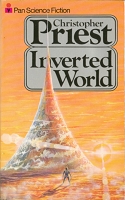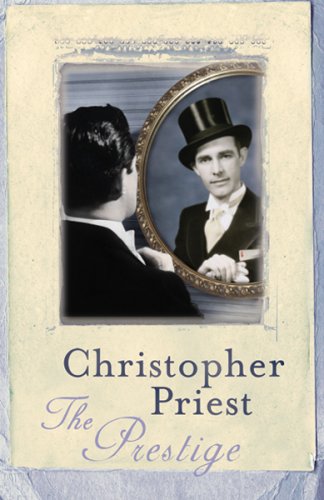

When Helward Mann leaves the city of Earth, he has no reason to believe that the world that lies beyond the walls could be anywhere but his home planet. Indeed, despite similarities, there is evidence which he cannot ignore - that slowly betrays all his preconceptions.
This is a novel which challenges your preconceptions of our three dimensional universe and time. To give you a sense of just how surreal Inverted World is one need only read the opening sentence; "I had reached the age of six hundred and fifty miles." The city of Earth defies logic and the planet on which it travels defies the laws of practical physics. Helward seeks adventure but what awaits him is something he was totally unprepared for but which the ruling bodies - Guilds - through their own sets of rules and sensibilities thrust newly indoctrinated members into. The city of Earth is an insular society which has two major problems. The first is to make sure that the city via a system of rails, sleepers, bridges, winches, pulleys and an external workforce keep it moving. The reason for this is a vaguely defined phenomenon called Optimum which it absolutely must follow. The second is the alarming drop rate of female births. Women from the villages through which the city passes through on its seemingly never ending journey are bartered for in order to mate with a man of their choosing from the city in hopes of procuring a much needed daughter for the near empty creche. It's very difficult to find a category into which Inverted World fits snugly but perhaps its best to describe as innovative non-genre fiction. I honestly found it very hard to give this novel a rating I'm comfortable with. Perhaps the fact that it's originality and slightly infuriating pedantic pace cajoled me into finish reading it until the early hours of the morning make me want to give it a high score. However, Christopher Priest' style and prose is quite simple and simplistic. The pace of the novel was uniform throughout and at times a very quaint measure of time and distance having no relationship and correlation to each other. A novel that will have you musing over what our sense of reality is but one laced with characters easily forgotten and forgettable. Ironically, Inverted World is both a page turner and slight disappointment which leaves you feeling swindled by its very poor ending.


Within this eerily realised and absolutely compelling novel awaits for the reader a story of two Victorian era magicians ... and their descendants. A young reporter named Andrew Westley knows of his family history. He is adopted, loves his parents, wishes and has wished never to know of his own birthright and whatever legacy that it contains. He is brought on a seemingly false pretext to rural Derbyshire to meet up with a religious sect which claims that its founder, now currently residing in a prison in the USA, has appeared before them. This magical act of bilocation is commensurate with Andrew's line of work and it is from this initial thwarted attempt to interview the cult's members that he is introduced to Kate Angier. Kate has an altogether better story to tell Andrew.
Both Kate and Andrew are descended from two very fine Victorian era magicians. However, both men were never on friendly terms and over two decades they both seek out and antagonise the other. Here is where the plot and delivery of the storyline really begins to ensnare the reader. We are given four viewpoints throughout the novel; the first is that of Andrew - his story is not relevant until the final few pages of the novel, the second is that of Kate as a young girl, the third is of Andrew's great grandfather Alfred Borden, the final recollection is that of Kate's great grandfather Rupert Angier. The meat of this novel is the ongoing fracas that occurs during the formative years of both magicians' professional life. Through the eyes of both men we are led into their lives. Both are great magicians, although each has different ideas and ways of implementing their own brand of illusion, and they continuously keep tabs on the progress and ingenuity of the others showmanship and execution. Here is where a knotted sense of the disdainful pettiness that one has for the other lies, they both look to scupper and sabotage the other on occasion. They are appreciative of the others ability, sometimes to the point of grudging respect but the harm and injury that one party has committed on the other can never be fully forgiven or forgotten. Though not very heavy on the dialogue, Priest exudes a wonderful level of familiarity with the inner workings of the magicians mind. Secretive to the point of paranoia, he adroitly explains through his two main protagonists how the audience, and indeed the reader, are led to believe that what they see is real though impossible.
This all eventually culminates with both men being drive to extremes and indeed taken by a brand of madness which the profession lends itself to. As for the prestidigitation - you know that you are being duped, but cannot help and marvel at how easily it is you allow it to happen. So it is also with the unreliable narrators of this piece. The more you read the more is revealed and more is obfuscated by the immeasurable quality of human nature and the mysteries of the human heart. I was enchanted by its eerie and beguiling narrative and prose. Absolutely recommended to one and all.

| Authors | Awards | Blogs |
| Fanzines | Index | Magazines |
| Publishers | Retailers | Reviews |